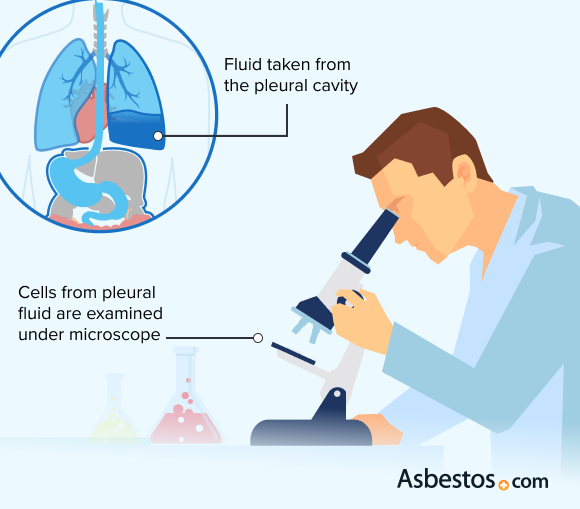Mesothelioma Pathology
Mesothelioma pathology is the study of malignant mesothelioma, a type of cancer related to asbestos exposure. Doctors use mesothelioma pathology reports of tissue biopsies to determine the diagnosis and develop treatment plans for patients with this disease.
What Is Mesothelioma Pathology?
Mesothelioma pathology refers to the study of malignant mesothelioma, a cancer of organ tissue linings. Pathology is the study of disease. The term also refers to the branch of medicine in which doctors called pathologists examine body tissue to diagnose and understand disease. Without pathology, doctors would not be able to accurately diagnose mesothelioma.
Doctors use pathology results to accurately diagnose mesothelioma. Treatment depends on this process. Additionally, pathology allows scientists and doctors to better understand how mesothelioma develops and spreads, which can lead to treatment improvements.
Mesothelioma Diagnostic Process
Diagnosing mesothelioma requires doctors to take specific steps, using imaging, tests and biopsy examinations to identify the disease.
- A health care professional obtains a medical history and completes a physical exam to identify signs and symptoms of mesothelioma.
- Your provider may order imaging tests, such as a chest X-ray and computerized tomography scan of the chest and abdomen, or certain blood tests to look for changes caused by mesothelioma.
- When tests suggest mesothelioma, doctors order a biopsy to collect cells and/or pieces of tumor for a pathology examination.
- Pathologists examine the sample under a microscope and perform special tests for mesothelioma diagnosis.
After diagnosing mesothelioma, your providers will use your test results to determine its stage. The stage of mesothelioma affects treatment and prognosis.
Understanding Your Mesothelioma Pathology Report
Pathology reports are descriptions of the tissue, cell, blood sample or part of an organ that was removed during a biopsy. The pathologist who examines the sample completes these reports.
Most people with mesothelioma will receive a pathology report from their doctor at one point or another. Each report contains certain components. Patient Advocate Danielle DiPietro notes, “When speaking with people about their mesothelioma diagnosis and they don’t know their cell type, for example, I explain that it can be found on their pathology report.”
- Patient Information: Your name, date of birth, patient ID number and/or Social Security number
- Case Number: The case number identifying the specimen
- Date and Procedure Type: The date of the procedure used to obtain the sample and its type (blood sample, surgery or biopsy)
- Medical History: A brief description of your medical history and current clinical diagnosis
- Specimen Description: A gross description (how it looks to the naked eye) and a microscopic description of the specimen
- Final Diagnosis: The pathologic diagnosis based on the pathologist’s examination of the sample
- Pathology Information: The name and signature of the pathologist, along with the name and address of the pathology lab
For people with mesothelioma, the specimen description section of the pathology report will include details about cell type and the markers identified with special staining. Markers of mesothelioma are antigens, which are proteins made by immune cells in response to foreign substances. These antigens appear in mesothelioma cancer cells and help pathologists accurately diagnose the condition.

Learn about your diagnosis, top doctors and how to pay for treatment.
Get Your Free GuideTypes of Mesothelioma Pathology
The two types of pathology involved in a mesothelioma diagnosis are histopathology and cytopathology. The different categories of pathology are based on the part of the body being studied.
- Cytopathology: Studies cells obtained from body secretions and fluids.
- Histopathology: Involves examination of body tissues, collections of cells with similar behavior that work as a unit.
Both types of pathology rely on the microscope for examination. Cytopathology focuses on examining individual cells from body fluids or fine-needle aspirations. It offers a less invasive diagnostic approach for early detection and monitoring. Histopathology is required to confirm mesothelioma and distinguish it from other cancers.
Histology
Histologic evaluation of a tissue sample is usually required to diagnose mesothelioma. The three cell types of mesothelioma — epithelioid, sarcomatoid and biphasic — are classified based on how a tissue sample looks under the microscope. Each cell type of mesothelioma responds to treatment differently.
Epithelioid mesothelioma is the most common type and accounts for between 50% and 70% of all mesothelioma cases. Sarcomatoid and biphasic types each represent about 10%-15% and 20%-30% of cases, respectively.
Immunohistochemical stains use antibodies to detect certain substances in a tissue sample that can help tell mesothelioma apart from similar-looking cancers, such as types of lung cancer. These stains change the color of the sample based on which antigens are present.
Cytology
Mesothelioma cytology involves examining the fluid in the pleural cavity. The pleural cavity is the space between the pleura, the two tissue layers that cover the lungs and chest wall. In a person with mesothelioma, this fluid can contain cancer cells and/or other substances that suggest the presence of cancer. Pathologists can use this information to help with a mesothelioma diagnosis.

Cytology on its own isn’t enough to diagnose mesothelioma. However, when performed by an experienced pathologist, cytologic evaluation combined with imaging and/or blood testing can help to diagnose mesothelioma. A tissue biopsy with histology testing remains the best way to get an accurate cell-type diagnosis.
What Happens After You Receive Your Pathology Report
Pathology reports guide mesothelioma treatment, so receiving your report will generally lead to a discussion about your potential treatment options. If you receive the report before discussing it with your doctor, it’s important to go over it and identify any questions you have. This initial review allows you to go into your doctor’s visit prepared to discuss your results.
If you become overwhelmed by the conversation about your diagnosis, know that you’re not alone. Your doctor is there to answer questions and support you. Additionally, if you’re interested in getting a second opinion on your diagnosis and treatment, patient advocates can help connect you with specialists and cancer centers near you.
Along with helping you find doctors, the Patient Advocates at The Mesothelioma Center are available for additional support. Advocates often provide medical resources, help with navigating the health care system and assistance in applying for insurance, among other benefits.
This Page Contains 7 Cited Articles
The sources on all content featured in The Mesothelioma Center at Asbestos.com include medical and scientific studies, peer-reviewed studies and other research documents from reputable organizations.
- Kanayama, M., Takenaka, M., Yoshimatsu, K.et al (2024). Sarcomatoid malignant pleural mesothelioma: a case of long-term recurrence-free survival following curative intent surgery alone. Retrieved from https://doi.org/10.1186/s40792-024-01939-1
- CDC. (2023, June 28). Mesothelioma. Retrieved from https://www.cancer.org/cancer/types/malignant-mesothelioma/detection-diagnosis-staging/how-diagnosed.html
- Cancer.gov. (2021, May 21). Stages of Malignant Mesothelioma. Retrieved from https://www.cancer.gov/types/mesothelioma/patient/mesothelioma-treatment-pdq#_26
- College of American Pathologists. (2021). How To Read Your Pathology Report. Retrieved from https://documents.cap.org/documents/how-to-read-pathology-report.pdf
- Hjerpe, A. et al. (2015). Guidelines for Cytopathologic Diagnosis of Epithelioid and Mixed Type Malignant Mesothelioma. Retrieved from https://doi.org/10.4103%2F1742-6413.170726
- Inai, K. (2008, March). Pathology of Mesothelioma. Retrieved from https://doi.org/10.1007%2Fs12199-007-0017-6
- Brown, R. (n.d.). Histopathology.Retrieved from https://www.rcpath.org/discover-pathology/news/fact-sheets/histopathology.html
-
Current Version
-
November 25, 2024Written ByDr. Chelsea AlvaradoEdited ByWalter Pacheco

![[Question Fixed] (11 & 12) What is pathology and why is it important for mesothelioma patients?](https://www.asbestos.com/wp-content/uploads/f627a8af6557527c4d91b23530e90eb2-768x0-c-default.jpg)






